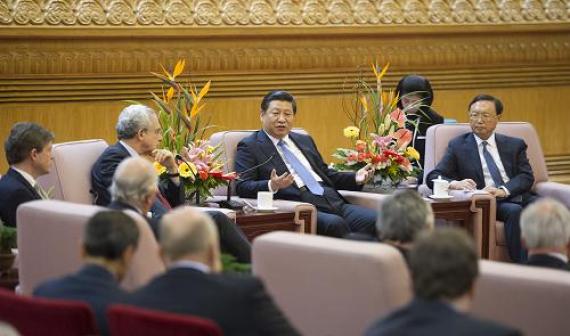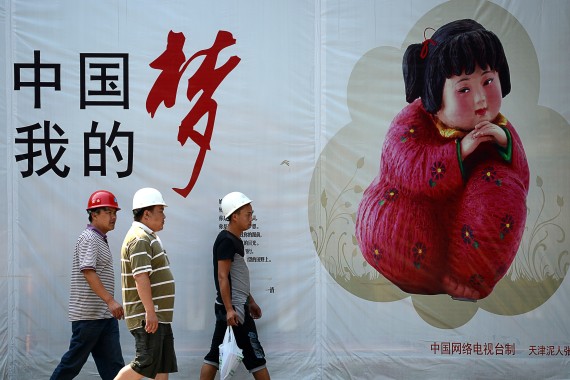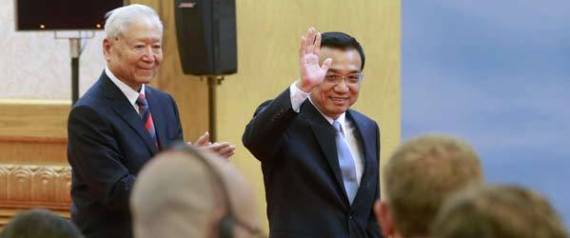达沃斯-当政治精英在达沃斯齐聚一堂,共商时局时,中国越发成为一个绕不开的话题。十年之内,中国很可能成为世界最大的经济体,它不仅改变世界经济的重心,还将改变地缘政治甚至文明的平衡。 然而,这些塞缪尔•亨廷顿所称的“达沃斯人”的主流观点,依然以数世纪以来西方和美国主导的全球化为基础,在很多方面过于偏狭。
要了解未来十年中国乃至全球化的方向,我们最好跳出西方的窠臼,从中国现任领导人的角度观察未来。
这不是拥抱他们的世界观,而是承认这样的事实:他们思考和行动的方式将从根本上塑造这个时代。中国往哪走,世界也往哪走的趋势已越发明显。
访问习近平
去年11月,在中共十八届三中全会召开前夕,我们同伯格鲁恩研究所21世纪理事会的其他几名成员有幸在人民大会堂会见习近平。我们抓住这次难得的机会,与习近平进行了广泛的交流,亲身接触到了中国新领导人的思想。
我们还会见了李克强总理、解放军高级将领、全国人大官员,以及浙江、广东和云南省省长和党委书记。
在访谈中,习近平很随和、放松。他一点官僚架子都没有,但展现出一位不畏艰难的成熟领导人的强大气场。
跟他的前辈毛泽东或邓小平一样,习近平话里有很多中国的俗语。“我们中国人说,读万卷书,行万里路,”谈话伊始,他就若有所思地说,“中国是有着5000多年历史的文明古国,有时连我们自己都不清楚从哪儿算起。就像古诗所言:横看成岭侧成峰,远近高低各不同。不识庐山真面目,只缘身在此山中。”
习近平自信地宣称,自170年前的鸦片战争以来,“我们从未如此接近”实现中华民族伟大复兴的梦想。
习近平相信中国将“避免中等收入陷阱”,实现2020年之前人均GDP翻一番的目标。他预计中国经济将在未来“10至20年间”以最低7%的速度增长。这一目标将不难实现,因为中国将进行以市场为导向的改革、加速城镇化并从廉价劳动力和出口导向型转向内需型增长。
“未来几年,中国城镇化率将每年上涨1个百分点,”习近平说,“数亿农民工会进城……但不会出现贫民窟,因为我们能够保持增长,创造机会。”他说,2014年,中国城市将创造1200万工作岗位。
但是习近平强调,GDP的增长不是唯一目标。他指出中国所有的问题都是相互联系的,不能孤立地看。他说“以人为本”的改革将“综合经济、政治、社会和生态环境”,同时加强“党的建设”。
他说,弥合收入差距、带领2亿人口走出贫困是首要目标。正如李克强总理所指出的,中国的改革之路必须从“量”向“生活质量”转变,也包括生态环境的改善。
习近平在十八届三中全会上提出的新政承诺废除劳教制度,放宽计划生育和城镇户籍制度,保障农民财产权益并开放多个新领域,让市场发挥“决定性作用”。
西方报告鲜有提及,关键的改革还包括让地方法院不再受制于地方政府,尤其重要的是让纪检部门相对于党委更具独立性(指强化上级纪委对下级纪委的领导——观察者网译注)。
同时,习近平加强了对共产党的领导,加强中央控制,统一思想,打击聒噪的大V。
在我们访问的共产党领导人看来,经济和社会自由与政治控制并不矛盾。事实上,他们认为,后者是前者的前提条件。自由和控制是一体两面。
对他们而言,只有中央政府足够强大才能对抗外来冲突,打破既得利益、改革国企和地方党派集团,并收拾互联网上的“兴风作浪者”。
从这个角度来说,习近平是邓小平的忠实追随者,虽然今天形势没有那么严峻,环境也更加平和。邓小平是个实用主义者,他不断在开放和严打间寻求平衡,既保证发展,也保持稳定。他放松对经济的管控,使数亿人摆脱贫困;同时他铁腕镇压了天安门政治事件。
习近平多次援引邓小平的话,以表明他正循着邓小平的脚步,中国现在正处于邓小平改革的“深水区”,而邓小平也曾表示,这一阶段“将持续100年”。
21世纪理事会成员郑必坚也参与了会谈。他是邓小平著名“南巡”报告的主要作者。该报告重启了天安门事件后停滞的中国改革。他的出席无疑意味着,在新一轮改革中,邓小平道路的合法性毋庸置疑。
中国不会向世界关闭大门
习近平强调,中国只有参与到今天这个相互依存的世界中,才能实现“中国梦”。“中国越发达,就会越开放。”他说,“中国不可能把早已打开的大门再关上。”
在这二十年里,中国将在全球事务上“变得更主动”,会和其他国家一道制定新的规则。“我们会担负起更多的国际责任,在国际事务和国际体系改革中扮演更积极主动的角色。”在回答英国前首相戈登•布朗关于未来几年G20领导人问题时,习近平答道。
“历史的趋势”是发展而不是冲突,用郑必坚的话来说,就是建立“基于不断扩大的利益汇合点的利益共同体”,涉及的领域包括自由贸易、金融体系稳定和应对气候变化等。
避免修昔底德陷阱
习近平同意郑必坚著名的中国“和平崛起”论。“强国一定会寻求霸权的论断并不适用于中国。”习近平认为,“回顾我们悠久的历史和文化背景,这并不是中国的文化基因。”他甚至提到了斯巴达和雅典的历史:“我们都要团结一致,避免修昔底德陷阱——即新兴国家和发达国家之间,或是发达国家与发达国家之间破坏性的紧张关系。”(“修昔底德陷阱”由古希腊史学家修昔底德在阐述雅典和斯巴达两国战争时提出来。长达30年的战争毁灭了两个希腊国家,修昔底德总结说,“使得战争无可避免的原因是雅典日益壮大的力量,还有这种力量在斯巴达造成的恐惧”。——观察者网译注)
然而,从和平发展是历史必然的角度来看,我们所接触的解放军领导人的言谈充满挑衅,颇有见地却也令人不安。
中日两国从未同时强大过。用以赛亚•伯林关于自信国家主义的说法,如今,它们都是被屈辱“压弯的嫩枝开始反弹”。虽然中国现在骄傲地站了起来,但正如习近平所言,回溯鸦片战争和日本侵华时期,中国仍很受伤。
近几十年来的经济停滞让日本的自信心受挫,如今它正努力走出阴影,包括采取更果断的“积极和平主义”的军事姿态。这是和中国在东海更明确的“主动防御”对着干。2013年12月,中国单方面制定“东海防空识别区”。
一党执政,戈尔巴乔夫和中国开放
在两天的密集对话中,我们的中国同行表达了对西方的无奈。西方无法从中国的角度看待中国改革,也不能不把自己捧成像雷音霍尔德•尼布尔(Reinhold Niebuhr,美国神学家——观察者网译注)所说的那样,是人类通往圆满的朝圣之路上的导师。
全国人大常委会一名高官直言:“西方不会相信中国在进步,除非我们也出个戈尔巴乔夫。”
在他们看来,这一争论的核心是西方不愿将一党制视为一种合法的治理模式。
甚至中国当今很多自由主义人士也在质疑,对于中国这样又庞大又复杂的国家而言,一人一票的多党制民主是否是治理社会的最佳方式。虽然他们也希望终止腐败和政府专断滥用职权,但没有人想要复制政党无能、政治僵局和整体失灵。西方民主历史上的三个范本——雅典、罗马和华盛顿都在重复这一局面。
在他们眼中,共产党可能受腐败和太子党特权困扰,但它不是独裁政党。对于他们而言,这是一个7800万人口的强大共识体系,该体系能够在长期政策上达成一致,并赋予领导层权力以果断落实。
他们通过不断与利益相关各方协商、权衡,达成内部一致,而不是像西方那样分裂全体国民、制造对立,或因外部竞争走向两极分化和瘫痪。这是中国治理的高明之处。只要有竞争激烈的选贤任能机制做保障,而不被特殊利益集团绑架,该体制就能良好运行下去。
正如北京大学教授潘维所言:“选贤任能原则在中国治理历史上所占的地位,和多数投票制在西方民主中所占地位一样重要。”
人们似乎不太确定的是,必须保持其统治话语的一党制该如何处理在社交媒体和微博带来的个人言论表达的爆炸。
数亿人在微博上抱怨有毒牛奶、动车事故、被掠夺的土地和腐败的官员。微博已取代了邓小平时期的天安门,成为当代中国更具影响力的公共广场。关键问题是,是党成功“制衡”微博,还是相反。
习近平能否灵活处理这种权力的转移,是事关成败的未知因素之一。目前,任何两个在网上发泄不满的人,连在大街上碰面都不行。三位著名的反腐人士最近因未经许可上街“聚集”被捕。
新法规还规定,转发“谣言”500次以上的将构成犯罪。
在许多因越线而被请去“喝茶”的大V中,寒蝉效应在扩散。针对拥有数百万粉丝“大V”的严厉打击已经展开。即使他们只是在响应政府打击腐败、维护宪法权威的号召。宪法保障的正是言论自由以及法律面前人人平等。
由于担心重蹈戈尔巴乔夫领导下苏联共产党的覆辙,中国共产党努力避免前苏联的“开放政策”(glasnost),或透明政策。但微博却提供了这种可能性。
矛盾的是,这样下去,他们可能招致竭力要避免的厄运。当苏联共产党谎言和虚伪的幌子被揭穿时,国家已被掏空。但是中国和苏联有很大不同。中国领导人不是《皇帝的新装》里的皇帝,党和政府过去30年都在为社会服务,贡献卓著。
确实,如果中国共产党允许公众公开言论,“中国特色的开放”将支持而非削弱中共。
我们在北京公开讨论了社交媒体,每个人都对个人经历有所体会,并愿意与他人分享。审查这一事实只会进一步瓦解政府的话语权,而不是加强其权威性。
历史的正面还是反面?
冷战结束后的数十年来,常常有人预言中国模式要崩溃了,但到如今,中国不仅没有崩溃,还跻身顶尖经济强国之列。
达沃斯论坛上的精英们要拓展眼界,要看到中国道路,这样才算得上真正的国际视野。习近平领导下的未来十年将最终决定中国治理体系的成败。两种结果都将对世界产生根本性的影响。
How The World's Most Powerful Leader Thinks
21/01/2014|Nicolas Berggruen/ Nathan Gardels|The World Post
DAVOS - As the power elite gathers in Davos for their annual confab on the state of the world, China looms larger than ever. Within a decade it is likely to be the world's largest economy, shifting not only the economic center of gravity, but also the geo-political and even civilizational balance.
Yet, the dominant worldview of what Samuel Huntington once called "Davos man," still rooted in the centuries-long ascent of the West and American-led globalization, tends in many ways to remain more provincial than global.
To understand where China -- and globalization -- are headed in the next decade, it is best to take off the Western lenses and look at the future from the standpoint of the country's present Communist Party leadership.
It is not a matter of embracing their view of the world. It is a matter of acknowledging the reality that the way they think and act will fundamentally shape the times ahead. Increasingly, where China goes, so goes the world.
MEETING XI JINPING
Along with other members of the Berggruen Institute's 21st Century Council, we had the opportunity to gain a firsthand glimpse into the mindset of China's new leadership during a rare, wide-ranging discussion with Xi Jinping at the Great Hall of the People in November on the eve of the Central Committee Plenum. (You can read Xi's extended remarks here.)

21st Century Council members meeting with Xi Jinping in the Great Hall of the People in November. (Huang Jingwen/Xinhua/Landov)
We also met with Premier Li Keqiang as well as top generals of the People's Liberation Army and other ranking officials from National People's Congress as well as governors and Party secretaries from Zhejiang, Guangdong and Yunnan provinces.
In our conversation, Xi was informal and relaxed. He hadn't the least air of the usual stolid technocrats, but rather that of a fully formed leader prepared to take up what everyone acknowledges are towering challenges.
Like Deng or Mao before him, Xi's remarks were peppered with classical allegories. "As we Chinese say, one needs to read ten thousand books and journey ten thousand miles to gain understanding," he mused at the outset of our dialogue. "Since China is an ancient civilization with over 5000 years of history, sometimes we ourselves don't even know where to start. There is a famous poem about Lushan Mountain that says when you view it from different directions you get a different impression. And maybe my own perspective has limitations. As the poem also says, you won't have the whole picture of the mountain when you yourself are on it."
From his personal vantage point, Xi proclaimed with evident pride, "we have never been closer" to realizing the Chinese dream of rejuvenation after the long climb back from humiliation in the Opium Wars 170 years ago.

"Chinese Dream" wall poster in Beijing. (Wang Zhou/Getty)
Expressing confidence that China could "avoid the middle-income trap" and meet its goal of doubling per capita income by 2020, Xi predicted the economy would grow for the "next ten to twenty years" at a rate of at least 7 per cent. This would be possible because of the more market-oriented structural reforms, accelerated urbanization and the shift from low-wage exports toward domestic consumption.
"For years to come, there will be a 1 per cent increase in China's urbanization rate every year," Xi said, "as several hundred million farmers migrate to the cities.... but there are no slums precisely because we have been able to maintain growth and provide opportunities." In 2014, he said, 12 million new job opportunities will be created in China's cities.
But raising GDP does not stand alone as a goal, Xi emphasized. Noting that all of China's problems were related to each other and could not be tackled piecemeal, he declared that the "people-centered" reforms he was introducing would be "comprehensive economic, political, social and ecological" --- bolstered by "Party building."
Closing the inequality gap and ending poverty for the 200 million people who have been left behind during the decades of rapid growth are at the top of the agenda, he said. As Premier Li noted, China's reform path must also shift from "quantity" to "quality of life," including on the ecological front.
Xi's new policies, adopted at the Central Committee Plenum, promise to end labor re-education camps, ease the one child policy and migrant residency requirement in cities, grant property rights to farmers and open up many new areas to a "decisive role" for the market.
Though barely mentioned in Western reports, key reforms also include making local courts accountable to circuit courts instead of remaining under the control of local authorities and, critically, separating the corruption-fighting Central Disciplinary Inspection Commission from Party oversight.
At the same time, Xi has strengthened the grip of the Communist Party, accumulated more power at the center, asserted ideological orthodoxy and clamped down on raucous bloggers.
There is no contradiction, in the view of the Party leaders we met, between economic and social liberalization on the one hand and more political control on the other. In fact, in their minds, the latter is the condition for the former. Lightening up and tightening up are two sides of the same coin.
For them, only a strong state-Party at the center can forestall conflicts abroad and see the reforms through against vested interests of the state enterprises, local party bosses and what they see as the virtual "manufacturers of chaos" on the Internet.
In this respect, Xi is a true disciple of Deng Xiaoping, albeit in these less harsh, more tempered times. Deng was a pragmatist who continuously calibrated opening up and cracking down to both move forward and maintain stability. His loosened grip on the economy raised hundreds of millions out of poverty; his iron fist crushed the Tiananmen Square protests.
Xi invoked Deng Xiaoping more than enough to make the point that he was treading in his stead, noting that China was now in the "deep end" of Deng's reforms, which the former leader said "would last 100 years."
Our interlocutor in these meetings was Zheng Bijian, also a member of the 21st Century Council, who was a key author of Deng's famous "southern tour" report which re-launched China's reforms in 1992 after they were stalled by the Tiananmen episode. His presence was no doubt meant to confer Deng's legitimacy on the new wave of reforms.

Zheng Bijian and Premier Li Keqiang at the opening of the 21st Century Council meeting. (Chinese Foreign Ministry)
CHINA WILL NEVER CLOSE ITS DOORS TO THE WORLD
Realizing "the Chinese Dream" the Party chief stressed, can only take place by remaining engaged in today's interdependent world. "The more developed China becomes," he said, "the more open it will be. It is impossible for China to shut the door that has already been opened. "
On this score China is "ready to become more active" in global affairs and work with others to shape the new rules of the game. "We will shoulder more international obligations and play a more proactive role in international affairs as well as the reform of the international system," Xi said in response to a question from former British prime minister Gordon Brown about taking on the G-20 chairmanship in the coming years.
The "trend of the times" is to avoid conflicts damaging to development and instead seek to build, in Zheng Bijian's words, "communities of interest on the basis of expanding on the convergence of interests" in areas ranging from open trade to financial stability and battling climate change.
AVOIDING THE THUCYDIDES TRAP
Xi echoed Zheng's famous doctrine of China's "peaceful rise." "The argument that strong countries are bound to seek hegemony does not apply to China," Xi posited. "This is not in the DNA of the country given our long historical and cultural background." He even offered this surprising historical reference to Sparta and Athens: "We all need to work together to avoid the Thucydides trap - destructive tensions between an emerging power and established powers, or between established powers themselves."
From this perspective of peaceful development as the trend of the times, however, the belligerent tone of the PLA leaders we met was both insightful and unsettling.
Japan and China have never been great powers at the same time. Now, they are both "bent twigs springing back" from humiliation, in Isaiah Berlin's phrase about assertive nationalism. Though proudly on its feet now, China is still wounded going back to the Opium War, as Xi mentioned, and Japanese occupation.
Japan's pride has been damaged by the recent decades of economic stagnation from which it is now trying to recover, including through the more assertive military posture of "active pacifism." This bumps up against China's more assertive posture of "active defense" in the East China Sea marked most recently by its surprise, unilateral declaration in December of an "air defense identification zone."
ONE PARTY RULE, GORBACHEV AND CHINESE GLASNOST
During two days of intensive talks in Beijing, our Chinese counterparts expressed frustration at the inability of the West to see China's reform path on its own terms instead of acting as if we were the tutors of mankind on its pilgrimage to perfection, as Reinhold Niebuhr once put it.
The chairperson of one of the most powerful committees of the National People's Congress lashed out on this point: "The West will never believe that China is advancing until we produce a Gorbachev."
At the heart of this dispute, in their view, is the unwillingness of the West to accept the one-party system as a legitimate model of governance.
Even many liberals in China today doubt whether one-person-one-vote multiparty democracy is the best way to govern a society as large and complex as China. While they want an end to corruption and arbitrary abuse by authorities, few want to replicate the partisan paralysis, gridlock and general dysfunction they see today across the three historic holds of Western democracy -- Athens, Rome and Washington.
In their eyes, the Communist Party, afflicted as it may be with corruption and princeling privilege, is not a dictatorship. For them it is a 78 million strong consensus-forming body that arrives at agreement on long-term policies and then grants the collective leadership the power to decisively implement them.
To attain internal consensus through endless rounds of consultation and trade-offs with stakeholders instead of dividing the body politic against itself and inviting polarization and paralysis through external competition, as in the West, is for them a superior way to govern. As long as there is internal competition of ideas and personnel based on merit and performance instead of special interest pleading the system should work well.
As the Peking University scholar, Pan Wei, put it: "The meritocratic principle of competition holds the same central position in the history of Chinese governance as the electoral principle of the majority holds in Western democracy."
What everyone seems unsure about is how a one party system that must maintain its ruling narrative can handle the explosion of individual expression through social media and micro-blogging.
Weibo -- where several hundred million people log on to complain about tainted milk, train wrecks, stolen land and corrupt officials -- has replaced the Tiananmen of Deng Xiaoping's day as the far more powerful public square of modern China. The great question is whether the Party will succeed in "checking and balancing" weibo, or if weibo will balance and check the Party.
How deft Xi's hand will be in handling this powershift is one of the game-changing unknowns in the times ahead. For now the Party aims to stop any two people who vent on the Net from ever meeting in the street. Three prominent anti-corruption critics were recently arrested for "assembling" together without a permit.
New rules also threaten to punish anyone who re-posts "mis-information" to more than 500 others.
A chilling effect has already set in as many bloggers who cross the line are hauled in "for a cup of tea served with fear." And there has been a harsh crackdown on the so-called "big bloggers" who have millions of followers - even if they are only echoing the appeals of the leadership to tackle corruption and defend the constitution under which free expression and equal treatment under the law is guaranteed.
Fearing the fate of the Soviet Communist Party, which collapsed under Gorbachev, the Chinese Communist Party is trying to curb the "glasnost" - or transparency - that weibo has enabled.
By doing so, paradoxically, they risk inviting the very fate they seek to avoid. When the veil was lifted on the lies and false claims of the Soviet party, there was nothing left. China could not be more different. In China, the emperor does have clothes because the Party and government have performed for society over the past 30 years.
Indeed, "glasnost with Chinese characteristics" could bolster the Party instead of weaken it if it openly allows the public to air their concerns and addresses them.
As we openly discussed in a panel on social media during our Beijing visit, everyone knows what is happening in their lives and shares that with others. Trying to censor reality will only further undermine the governing narrative, not strengthen its authority.
THE RIGHT OR WRONG SIDE OF HISTORY?
In the decades since the end of the Cold War, the oft-predicted collapse of China's model has not only not come to pass; China has advanced to the top ranks of the global economy.
To become truly global in their outlook, the Davos elites must widen their view to take into account the path set by China's leaders. The next ten years under Xi Jinping will be the ultimate test of whether China's system of governance ends up on the wrong or right side of history. Either outcome will fundamentally affect the state of our world.











